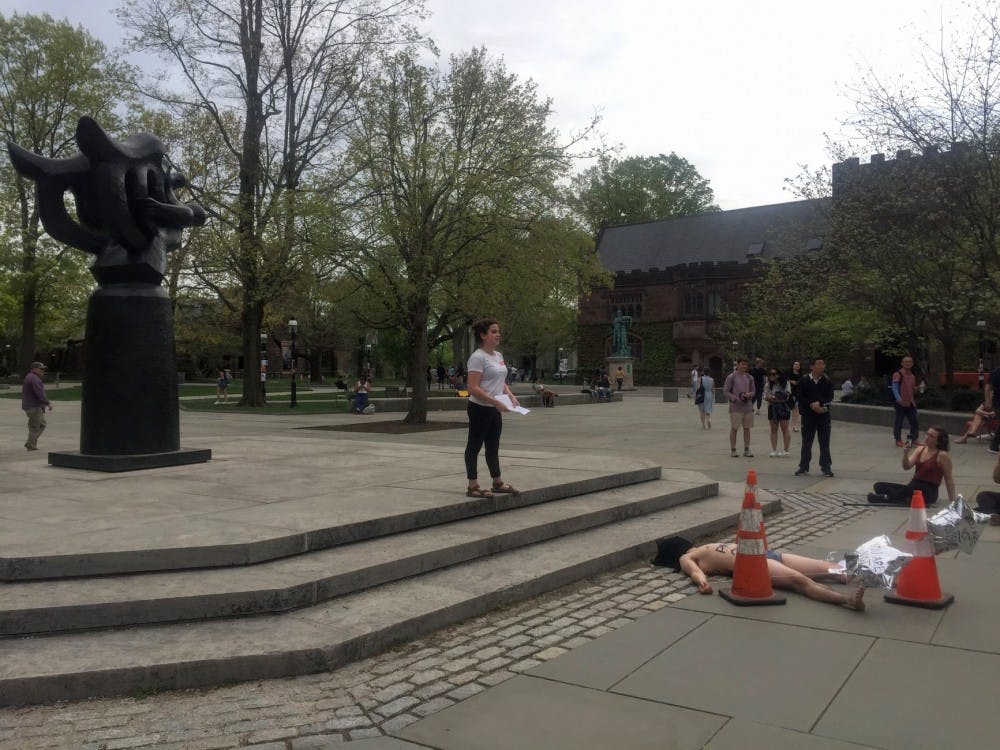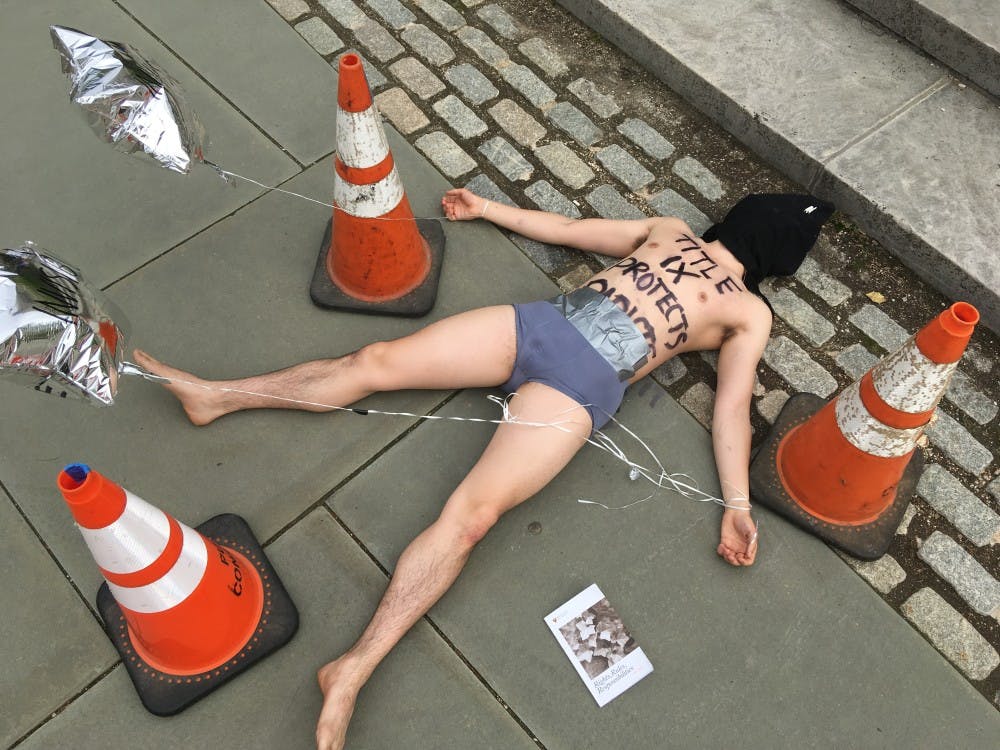Amid the students, campus tour groups, and community members strolling about the Firestone Library Plaza on Tuesday afternoon, a student wearing only his underwear lay sprawled on the concrete. A black bag covered his face, and the words “Title IX Protects Rapists” were emblazoned on his torso in black ink.
“This is, I think, more of an aggressive statement,” said Camille Liotine ’20, one of the protest organizers. “A flyer won’t get that kind of attention.”
The protest, which utilized the slogan “Princeton Protects Rapists,” was organized by a group of students who have either personally interacted with the Title IX office on campus or know someone who has. The intention of the demonstration, according to Liotine, was to contribute to dialogue about the treatment of students involved in Title IX cases at the University.
“There have been growing concerns for quite some time that the Title IX office on campus is grossly mistreating students’ cases and are not providing justice to as many students as they need to be,” Liotine said. “We’re really trying to bring awareness to the wrongdoings of this office, and we’re trying to speak to the administration and tell them that they need to change how their office is operating on campus.”
The two-hour demonstration is one of several incidents that have occurred this month relating to activism against the Title IX office. During Princeton Preview earlier this month, graffiti messages that read “Title IX protects rapists” and “Fuck Title IX” were found in Prospect Gardens.
More recently, graffiti reading “Princeton protects rapists” was written on the walk outside of Dillon Gymnasium. The concrete tile on which the graffiti was written was later removed.
“They were very direct in addressing the problem that exists. And I think that directness was required in order to get the attention of the University and actually have them take action rather than continuing to ignore this problem for further years,” said Zoe Zeitler ’20, a protest attendee, in response to the messages on campus leading up to the protest.


As part of the two-hour protest, Liotine delivered a personal statement describing the motivations for the protests and requesting the University to make changes to the way in which it handles Title IX cases.
“I’m very happy that she spoke her mind and that she is telling everyone very publicly about this problem and her personal experience,” Zeitler said about Liotine’s statement. “It usually takes a personal voice, a personal perspective, to really show people the significance and the weight and the importance of this issue.”
In an email to The Daily Princetonian following the protest, Deputy University Spokesperson Michael Hotchkiss expressed the University’s support for the protest.
“We respect the rights of all members of the University community to share their views on important issues such as this,” Hotchkiss wrote. “Sexual misconduct is deeply disturbing, and we hope students feel comfortable seeking the support that they need through the SHARE office and/or the Title IX disciplinary process.”

Hotchkiss added that, “although the circumstances of every sexual misconduct matter are different, the campus community should be assured that allegations are investigated thoroughly.”
“Complainants have extensive rights, including the right of appeal, and discipline is imposed in many cases,” Hotchkiss wrote. “Information about investigations, the rights of parties involved in cases and disciplinary outcomes is available online at https://sexualmisconduct.princeton.edu.”
Jarrett Fisher, Associate Dean of Undergraduate Students and Director of Student Agencies, was present at the protest, acting as University’s Open Expression Monitor. The monitor’s responsibility is to ensure that University policies regarding freedom of expression are upheld for both participants and attendees.
Dean Fisher declined to comment for this article.
In her remarks, Liotine highlighted the emotions that she, along with other students, have felt in their experiences with the Title IX office. The theme of erasure was significant for Liotine, and she mentioned that multiple, contradicting forms of erasure occur in the Title IX office.
“I have found that the University has just attempted to erase me — erase my rights, my voice, my agency, my memory of this experience, my credibility, my pain, and my love for learning,” Liotine said. “And as it was explicitly done, they erased my message.”
She added, “Meanwhile, my assaulter’s record has been wiped clean, just like the campus sidewalks that no longer carry the anguish of those who want to trust this University again and who finally have to be trusted by this University.”
Liotine concluded the protest with a final call to action to the University: “Don’t erase it, Princeton. Change it.”








